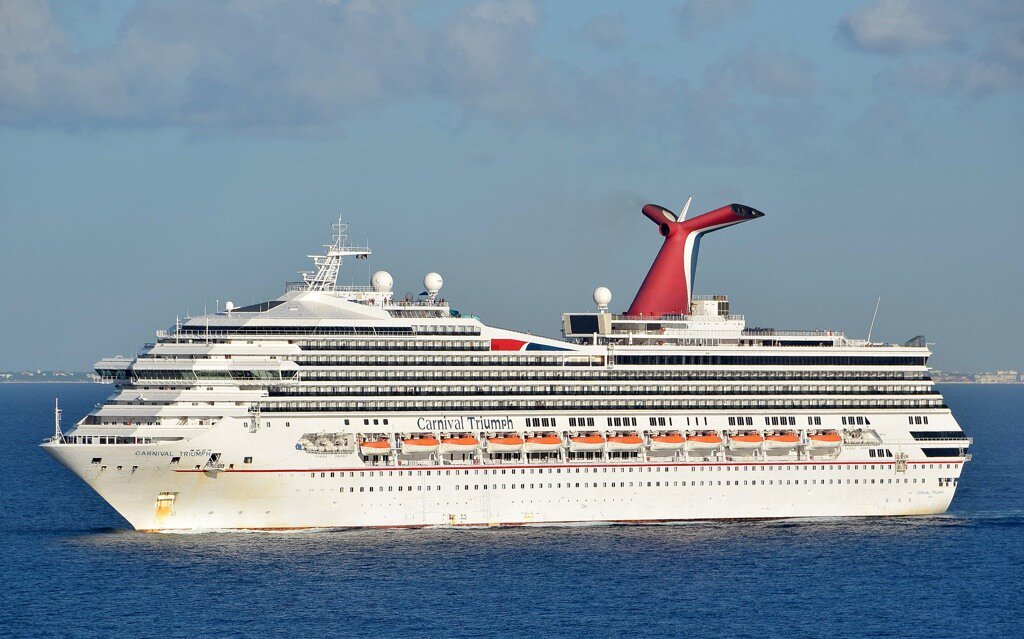Carnival Corporation & plc is the world’s largest leisure travel company and among the most profitable and financially strong in the cruise and vacation industries, with a portfolio of nine cruise lines. With operations in North America, Australia, Europe and Asia, its portfolio features Carnival Cruise Line, Princess Cruises, Holland America Line, Seabourn, P&O Cruises (Australia), Costa Cruises, AIDA Cruises, P&O Cruises (UK) and Cunard.
Carnival Corporation & plc today released its ninth annual sustainability report, detailing the key initiatives and progress made in 2018 toward its 2020 sustainability performance goals. The full 2018 report, “Sustainability from Ship to Shore,” was developed in accordance with the Global Reporting Initiative standard.
The company achieved its 25% carbon reduction goal three years ahead of schedule in 2017 and made additional progress on that goal in 2018. As part of its ongoing strategy to reduce carbon emissions, Carnival Corporation introduced in December 2018 the world’s first cruise ship able to be powered in port and at sea by liquefied natural gas (LNG), the world’s cleanest burning fossil fuel. Looking to the future, the company continues to chart its sustainability journey, using the United Nation’s Sustainable Development Goals as a framework to develop a new set of goals for 2030 to constantly improve environmental management, energy efficiency, health, safety and well-being objectives.
In 2018 Carnival Corporation also launched Operation Oceans Alive, a company-wide program to further its ongoing commitment to achieve and sustain environmental compliance and excellence. Designed to promote a culture of transparency, learning and commitment across its global operations, Operation Oceans Alive was introduced as an internal effort and call to action to further ensure that all employees receive proper environmental education, training and oversight, while continuing the corporation’s commitment to protecting the oceans, seas and destinations in which it operates. The initiative is now being expanded externally as the platform for the corporation’s commitment to achieving and sustaining environmental compliance and excellence, and will continue to expand through an increase in funding, staffing and responsibility.
“We take our commitment to sustainability and the environment very seriously,” said Bill Burke, chief maritime officer for Carnival Corporation. “We have 120,000 passionate employees in our organization, and it is a business imperative for each and every one of us to protect and preserve the oceans we sail and the communities we visit, with a relentless focus on sustainability and the environment. Our goal is to make every place we visit better than it was before we went there. To help us meet that goal, we continue to increase our levels of investment in new initiatives, improved procedures, robust training and innovative systems.”
Carnival Corporation first shared its 2020 sustainability goals in 2015, identifying 10 key objectives, including reducing its carbon footprint, improving ships’ air emissions, reducing waste generation, improving water use efficiency, and supporting guests, crew members and local communities. The company’s latest sustainability report shows that it is on track to meet those goals across its nine global cruise line brands, achieving the following environmental advancements by the end of 2018:
- Carbon Footprint: Achieved 27.6% reduction in CO2e intensity relative to 2005 baseline.
- Advanced Air Quality Systems: 74% of its fleet is equipped with Advanced Air Quality Systems, capable of removing virtually all of the sulfur from ships’ engine exhaust, enabling cleaner overall air emissions at port and at sea without impacting the marine environment.
- Cold Ironing: 46% of its fleet is equipped with capability to use shoreside electric power while the ship is docked, further reducing air emissions in ports where this option is available.
- Advanced Waste Water Purification Systems: Increased coverage of fleet-wide capacity by 8.6 percentage points from 2014 baseline. Together, the company’s standard and AWWPS systems meet and/or exceed water treatment requirements established by the International Maritime Organization and national and local authorities.
- Waste Reduction: Reduced non-recycled waste generated by shipboard operations by 3.8% relative to 2016 baseline. In 2018, the company started an initiative to evaluate its collective use of non-essential single-use plastic items and alternative options available in the market, with the goal of significantly reducing single-use plastics across the global fleet.
- Water Efficiency: Improved water use efficiency of shipboard operations by 4.8% relative to 2010 baseline to a rate of 59.6 gallons per person per day, versus the U.S. national average of 90 gallons per person per day.
Pioneering LNG and Advanced Air Quality Systems on Cruise Ships
Carnival Corporation is committed to developing innovative solutions that support sustainable operations and a healthy environment. These include the environmental technology breakthrough of making Advanced Air Quality Systems highly functional in the small confines of a cruise ship and utilizing environmentally friendly and low-emission LNG. Both solutions result in significantly cleaner air emissions.
In December 2018, Carnival Corporation made history with the launch of AIDAnova, the world’s first cruise vessel to be powered at sea and in port by liquefied natural gas. AIDAnova, from the company’s AIDA Cruises brand, is the first of a new class of next-generation “green” cruise ships. Leading the cruise industry’s use of LNG to power cruise ships, Carnival Corporation has an additional 10 vessels due for delivery between 2019 and 2025 for Costa Cruises, AIDA Cruises, P&O Cruises (UK), Carnival Cruise Line and Princess Cruises.
Carnival Corporation has led the cruise industry in developing Advanced Air Quality Systems – which reduce sulfur and particulate matter from engine exhaust – for marine application on cruise ships. Through an estimated $500 millioninvestment to date, the company has equipped 74% of its fleet with Advanced Air Quality Systems and plans to deploy the systems on more than 85 ships across its global fleet by 2020. Extensive independent testing has confirmed the company’s Advanced Air Quality Systems in many ways outperform low-sulfur fuel alternatives, such as marine gasoil (MGO), in providing cleaner overall air emissions from ship operations at port and at sea without impacting the marine environment – a safe and effective solution for the environment and in full compliance with the International Maritime Organization’s (IMO) 2020 regulations for sulfur emissions.
Enhancing Environmental Excellence
To further the company’s commitment to achieving and sustaining environmental compliance and excellence, Carnival Corporation introduced Operation Oceans Alive in January 2018 as an internal effort and call to action to ensure all employees receive ongoing environmental education, training and oversight.
In the program’s first year, the corporation continued to implement innovative technology solutions for sustainability, accelerate environmental training efforts and improve communications to achieve a higher level of environmental awareness and culture of environmental stewardship. Together with its guests, crew and shoreside employees, the corporation celebrated World Oceans Day at sea and presented Environmental Excellence Awards to honor the ships within the corporation’s global fleet with the best environmental performance, in addition to rolling out a new Health, Environmental, Safety and Security (HESS) employee of the month program.
Over the last three years, Carnival Corporation has implemented new and more effective procedures, crew members have taken hundreds of thousands of hours of training and the corporation has spent nearly $1 billion on environmental initiatives.
These efforts and others support Carnival Corporation’s long-term commitment to sustainability, responsible operations and protecting the environment, and are an important part of its supervised environmental compliance plan, which began in 2017. The compliance initiative includes regularly scheduled reports that provide transparency into the company’s progress and any areas of needed improvement.
Investing in the Future
In May 2018 at the Port of Barcelona in Spain, Carnival Corporation opened the Helix Cruise Center, a state-of-the-art terminal capable of accommodating its next-generation LNG ships. The Helix terminal, plus the company’s existing terminal at the port, represent Carnival Corporation’s largest combined terminal investment in Europe at over 46 million euros.
Also in May 2018 in Miami, Carnival Corporation opened its third state-of-the-art Fleet Operations Center; its three FOCs represent the commercial maritime industry’s most technologically advanced facilities. The FOCs feature a tracking and data analysis platform and integrated proprietary software application called Neptune that enables real-time information sharing between ships and specialized shoreside teams to support fleet operations. Representing breakthrough real-time technology with unmatched capability, the systems are further improving the safe passage of ships at sea while also improving operational excellence and supporting overall environmental initiatives.
In 2018, Cruise Lines International Association (CLIA) committed to a 40% reduction in the rate of carbon emissions across the cruise industry’s global fleet by 2030. As a CLIA member, Carnival Corporation is committed to doing its part to help achieve this goal, as it shares the International Maritime Organization’s vision of a carbon-free shipping industry by the end of this century.
Caring About Communities
As part of its company-wide commitment to protecting the oceans, seas and destinations in which it operates, Carnival Corporation has made additional strides to support the people and communities in the more than 700 ports visited by its global fleet. Seeking to positively contribute to the social, environmental and economic wellbeing of these communities, the company works with local governments, tourism organizations, nonprofit groups and other community stakeholders to invest in the ports of call its ships visit and to support healthy, sustainable development.
After a series of devastating storms in the Caribbean in 2017, Carnival Corporation committed to support a series of community projects in 2018 supporting children, education and emergency preparedness in the Caribbean through its $10 million pledge in funding and in-kind support from its philanthropic arm, Carnival Foundation, along with its brands, the Miami HEAT Charitable Fund, and the Micky and Madeleine Arison Family Foundation. Carnival Corporation and several of its brands have been working with local and international non-governmental organizations (NGOs), including UNICEF and United Way, to partner with several islands on community projects specifically tailored to their needs and designed to have a lasting impact.
Carnival Foundation and the Micky and Madeleine Arison Family Foundation also committed to aiding communities affected by Hurricane Florence in North and South Carolina, Super Typhoon Mangkhut in the Philippines and Indonesia’s earthquake and resulting tsunami in 2018, pledging up to $5 million to support the relief efforts and the long-term recovery strategy.
Carnival Corporation’s Costa Cruises brand partners with The Food Bank Network and others on the 4GOODFOOD program, which aims to halve food waste on board the Italian company’s ships by 2020. Through this unique and growing project, Costa Cruises considers every aspect from food preparation and consumption on board to the donation of surplus food. The expanding project has now been replicated in nine ports in the Mediterranean, and since its inception, has given a second life to more than 70,000 food servings, donated to food banks in each local port.
In Australia and the Pacific, Carnival Australia, a part of Carnival Corporation, supports indigenous entrepreneurs in the Pacific through YuMi projects, which translates to “you and me.” Working with the Australian government, Carnival Australia is identifying, developing and accelerating the development of emerging indigenous tourism operators in Vanuatu and Papua New Guinea to offer its guests rich, meaningful and authentic shore tours run by local people – part of the organization’s long-term approach to partner with communities to share the economic benefits of a successful cruising sector.
A Commitment to Diversity and Inclusion
Carnival Corporation is committed to building a diverse and inclusive workforce, employing people from around the world and hiring people based on the quality of their experience, skills, education, and character, without regard for their identification with any group or classification of people.
As a testament to that commitment, in 2018 the company earned a perfect score for the second consecutive year from the Human Rights Campaign’s Corporate Equality Index, the leading LGBTQ civil rights organization in the U.S. Carnival Corporation was also named to the first-ever NAACP Equity, Inclusion and Empowerment Index, which assesses U.S. companies on their commitment to racial and ethnic equity in every aspect of their business and operations.
Carnival Corporation continues to work with Catalyst, a leading U.S. nonprofit with a mission to expand opportunities for women, and with the Executive Leadership Council (ELC), whose mission is to empower African-American corporate leaders. Last year, the company was also honored by Forbes as one of America’s best employers for diversity based on its commitment to diversity and inclusion, and was named to the Forbes list of America’s best large employers overall.






